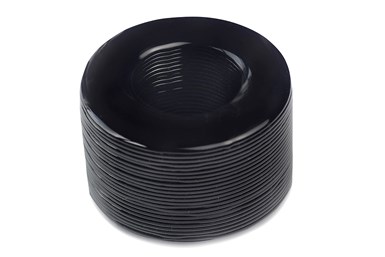ChromaMotive D65 Parts Perform Well in Range of Extreme Temperatures
Formnext 2023: The Shore D thermoset polyurethane is well suited for applications that have varying temperature requirements, in a range extreme cold to elevated temperatures from -30 up to 120°C.
With ChromaMotive D65, manufacturers can have the benefits of 3D printing with mechanical performance properties that are comparable to injection-molded TPU, HDPE and PP. Photo Credit: Chromatic 3D Materials
Chromatic 3D Materials’ ChromaMotive D65 is a a rigid Shore D thermoset polyurethane designed for reactive extrusion additive manufacturing (AM) with the company’s RX-AM printing platform. This material performs well in a range of extreme cold to elevated temperatures from -30 up to 120°C. It is compatible with Chromatic’s RX-Flow printers, which are suitable for development work and low- to medium-volume industrial production.
With very good low-temperature impact strength, ChromaMotive D65 is well suited for manufacturing winter sports gear like ski boots, snowshoes and snowmobile parts. It is also designed for other applications that have varying temperature requirements, such as parts for the aerospace, automotive and agricultural industries.
Chromatic’s RX-AM materials and technology platform is based on reactive extrusion additive manufacturing, a type of deposition 3D printing that uses chemical reactions. With ChromaMotive D65, manufacturers can have the benefits of 3D printing with mechanical performance properties that are comparable to injection-molded TPU, HDPE and PP. The material resists high impact, hydrolysis and abrasion, and withstands repeated friction, wear and tear. Moreover, its isotropic tensile properties ensure that 3D printed parts are uniformly resilient.
“With ChromaMotive D65, manufacturers that are producing rigid plastic components can take advantage of RX-AM’s fast print speeds and the ability to print on textiles, plastics and metals,” says Cora Leibig, Chromatic 3D Materials founder and CEO. “Now it’s possible to 3D print rigid parts at industrial volumes for everything from winter recreational equipment to aircraft interiors.”
- Learn about Chromatic’s RX-Flow 2500 3D printing system which features a compact workspace. The printer has a more compact workspace, while maintaining the cost efficiency, speed and quality output of the larger RX-Flow models.
- Read about Chromatic 3D Materials’ polyurethanes meeting flammability requirements for the aerospace industry. NIAR testing shows that multiple polyurethanes 3D printed by Chromatic are compliant with U.S. standards for use in aircraft interiors.
- Check out this article on Chromatic 3D Materials launching a rapid custom manufacturing service for common rubber parts. The service includes standard industrial shapes, including gaskets, seals, cylinders and grommets in customizable, nonstandard dimensions up to 16" in diameter.
Related Content
-
Possibilities From Electroplating 3D Printed Plastic Parts
Adding layers of nickel or copper to 3D printed polymer can impart desired properties such as electrical conductivity, EMI shielding, abrasion resistance and improved strength — approaching and even exceeding 3D printed metal, according to RePliForm.
-
Understanding PEKK and PEEK for 3D Printing: The Cool Parts Show Bonus
Both materials offer properties desirable for medical implants, among other applications. In this bonus episode, hear more from Oxford Performance Materials and Curiteva about how these companies are applying PEKK and PEEK, respectively.
-
What Does Additive Manufacturing Readiness Look Like?
The promise of distributed manufacturing is alluring, but to get there AM first needs to master scale production. GKN Additive’s Michigan facility illustrates what the journey might look like.












